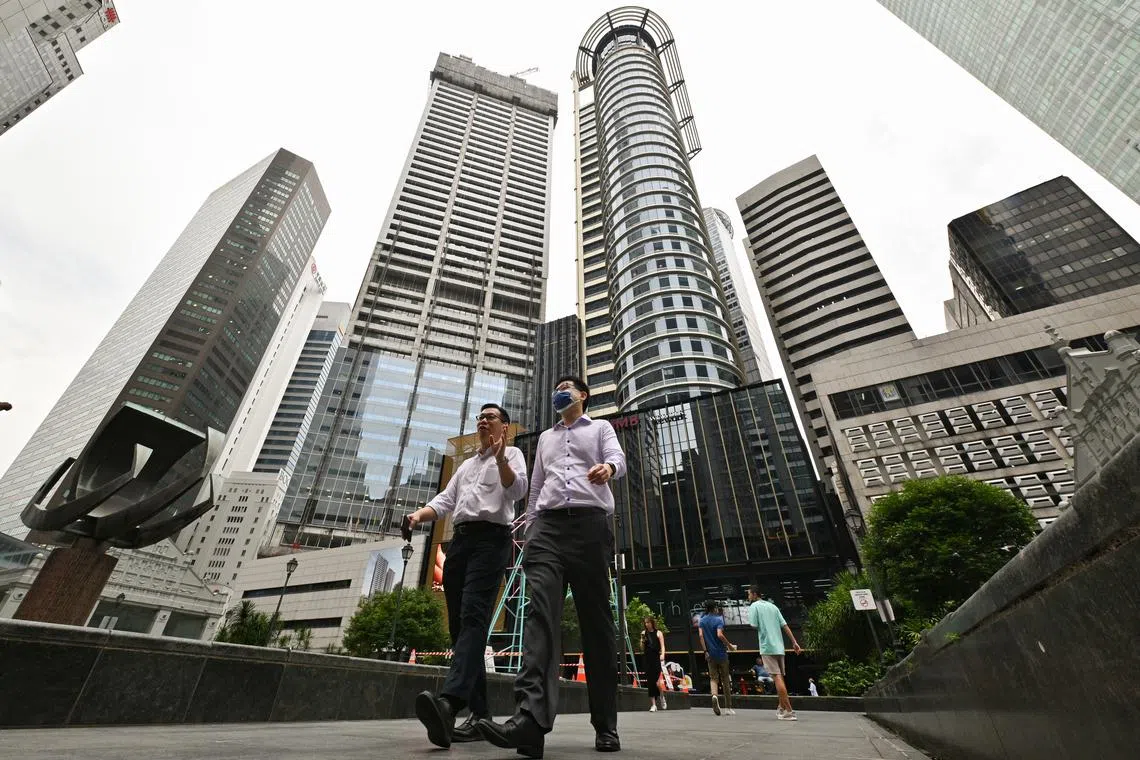Businesses can focus on productivity, tap schemes to stay competitive, say MPs
Sign up now: Get ST's newsletters delivered to your inbox

This comes as businesses continue to grapple with labour shortages and higher business costs in an inflationary environment.
PHOTO: ST FILE
Follow topic:
SINGAPORE - Singapore businesses will have to find ways to rise above the challenges of manpower constraints and increasing costs to thrive in today’s more uncertain economic environment.
To do so, they can focus on improving productivity, tap schemes to nurture the local workforce and make use of underused resources, suggested several MPs as they debated the Budget on Wednesday.
This comes as businesses continue to grapple with labour shortages and higher business costs in an inflationary environment.
Nominated MP Janet Ang cited how the latest National Business Survey found that 96 per cent of businesses are concerned about more costly manpower, having to attract and retain younger workers and coping with restrictions on foreign labour.
Meanwhile, cash flow is also a major challenge for small and medium-sized enterprises, she added.
“Businesses that had expressed optimism about the reopening of the global economy are now conveying a more cautious outlook as new disruptions surface and geopolitical fault lines deepen,” said Ms Ang, who is also a council member of the Singapore Business Federation.
Measures such as raising the Central Provident Fund ceiling and doubling paternity leave may also place additional manpower and cost pressures on employers, said Ms Foo Mee Har (West Coast GRC).
“Even before they have had the chance to fully digest the impact of earlier moves such as cost increases associated with the Progressive Wage Model and CPF contribution rates for older workers, employers will feel overwhelmed by another flood of pro-worker initiatives,” she added.
To tackle manpower shortages, more can be done to encourage Singaporeans to take up job roles at or higher than the S Pass and the Employment Pass (EP) qualifying salary levels, suggested Ms Ang.
“Perhaps the work environment and work conditions can be made more attractive to interest our local Singaporeans. For example, having a maximum number of work hours, flexible work arrangement, strong skills and career mentoring.”
Another option is to tap alternative sources of manpower. This includes employing older workers, people with disabilities, former offenders and current platform workers, added Ms Ang.
Ms Foo noted that there is no silver bullet for the longstanding manpower challenges confronting businesses.
“Employers must accept that the tight labour market is here to stay. They must up their game in offering compelling value proposition to attract and retain staff, rewarding them fairly, engaging them skilfully and investing vigorously in their capability development,” she said.
In the same vein, Ms Cheryl Chan (East Coast GRC) said that investing in the local workforce is one factor that will help to ensure Singapore’s continued competitiveness.
While the Jobs-Skills Integrators initiative announced in Budget 2023 could go some way in addressing the industry skills gap, Ms Chan called for more light to be shed on how the current continuous education training curriculum and the Industry Transformation Maps have helped to push the boundaries for companies.
Ultimately, to overcome Singapore’s inherent resource constraints, there is a need to significantly beef up productivity, said Mr Liang Eng Hwa (Bukit Panjang).
He noted that amid continued efforts to upskill the workforce, “the productivity of work is not solely dependent on workers”.
“A company’s overall productivity to a large extent depends on management, how resources and workflows are designed and organised, harnessing the use of data, technology, innovation and creativity to invigorate efficient solutions,” he said.
Some MPs noted the need to compete effectively for investments in the light of Singapore’s move to introduce a 15 per cent minimum effective tax rate for large multinationals in 2025.
The changes – made under the Base Erosion and Profit Shifting initiative, or BEPS 2.0, a global framework for the reform of international tax rules – will affect tax incentives for multinationals to set up shop here.
To compensate for the loss of preferential tax rates and to continue attracting investments, Singapore will have to spend on non-tax incentives such as training, subsidies and grants, said Mr Sharael Taha (Pasir Ris-Punggol GRC).
On this front, he gave the nod to a $4 billion top-up to the National Productivity Fund and the expansion in scope to include investment promotion as a supporting activity announced in last week’s Budget.
He further asked for details on the move, such as the type of industries targeted for investment promotion, and how to ensure the funds are used to drive productivity improvements.

